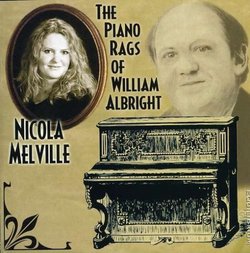| All Artists: William Albright, William / Albright, William Bolcom, Nicola Melville Title: The Piano Rags of William Albright Members Wishing: 0 Total Copies: 0 Label: Equilibrium Records Original Release Date: 1/1/2003 Re-Release Date: 7/29/2003 Genres: Jazz, Classical Styles: Chamber Music, Historical Periods, Classical (c.1770-1830) Number of Discs: 1 SwapaCD Credits: 1 UPC: 794055005720 |
Search - William Albright, William / Albright, William Bolcom, Nicola Melville :: The Piano Rags of William Albright
 | William Albright, William / Albright, William Bolcom, Nicola Melville The Piano Rags of William Albright Genres: Jazz, Classical
|
Larger Image |
CD DetailsSimilar CDs
|
CD ReviewsIf you like rag you need to know Albright Ursiform | Torrance, CA USA | 07/08/2007 (5 out of 5 stars) "Clearly rag although infused with a slightly more modern flavor than Joplin, Albright may be the only composer who wrote a significant number of rags that deserve to be mentioned in the company of Joplin's. If Melville's recordings of his pieces don't quite equal those the composer made himself (which as a group don't appear to be available from any source at the moment) they are nonetheless very good. If you like rag you need to know Albright, and this CD has excellent versions of his great rags!" Like Scott Joplin on speed John Grabowski | USA | 10/04/2008 (4 out of 5 stars) "William Albright (1944-1998) was one of a kind: a gifted composer of rather modern "serious" music, a dazzling virtuoso pianist and organist, and a composer of energetic, witty, downright crazy ragtime with co-conspirator William Bolcom. It's these rip-roarin' pieces of whimsy he seems best-remembered for. He and Bolcom wrote them together in the late-60s to 1974 as a sort of joke, from what I recall, and the project just took wings. I spoke with WA a few times in the mid-90s in preparation for a radio interview I alas never did. Regretfully, I never made it to Ann Arbor to meet him. My loss.
Here pianist Nicola Melville, a member of the music faculty of Minnesota's Carleton College, tackles these extraordinarily difficult rags, and is not always up to the task. She is most at home in the lyrical moments: she states her favorite of his rags is Sweet Sixteenths, and indeed she turns in a performance that to my ears is more heartfelt than Albright's own. But in the powerhouse pieces, such as the demonic Nightmare Fantasy Rag, there are spots where she nearly falls off the piano bench, and her technical shortcomings (rhythmic stiffness, a certain pedantic attention to mathematical perfection that robs the music of some of its swing and freedom) become evident. In Grand Sonata in Rag, for example, the fast sections lack power and the left-hand rumblings are too fussy and precise--they lose all that primitiveness they need, the same way Pierre Boulez's Right of Spring is too clinical. But the slow middle section is gorgeous, and her ramp-up to the recap starting at 5:25 is perfectly-weighted. She never builds enough steam for the smash-bang ending, however. Similarly, the humorous Brass Knuckles, which starts off promisingly, is eventually subjected to all sorts of odd rubato and slowing-downs that rob it of its repetitive humor--hearing Albright's own interpretation makes me literally laugh out loud. Not so here. Similarly, the playful "snap" of the opening to Onion Skin rag is missing here. And there are moments of syncopation that seem to throw Ms. Melville for a loop. She ain't got rhythm. Other parts are marvelous. Oddly, she really does get gritty and rock in the coda to Nightmare Fantasy Rag. And the more restrained pieces, such as Ragtime Turtledove and the aforementioned Sweet Sixteenths, are sensitive, and very personal statements in the hands of Ms. Melville. But to give a perfect idea of where her limitations lie, the romp in The Queen of Sheba is never wild enough, and the repeated F-sharp leading to the coda is rendered so pedantically, as though she were counting out the notes, that all fun is lost. It's in moments like this that I really miss the fireworks that came from the fingers of Mr. Albright, who really was an astonishing keyboard wizard. Still, while this music is rendered imperfectly, this release is worth owning. It's unique in the annals of American music, and why it's not better known is a mystery to me. Albright's own stunning recording on Musical Heritage is long gone, which is sad. If you collect old vinyl, you should look for that album in the used shops. Meanwhile, buy this, enjoy Albright's unique rags, but remember there are far more jaw-dropping performances out there that you should be looking for. " |

 Track Listings (13) - Disc #1
Track Listings (13) - Disc #1

